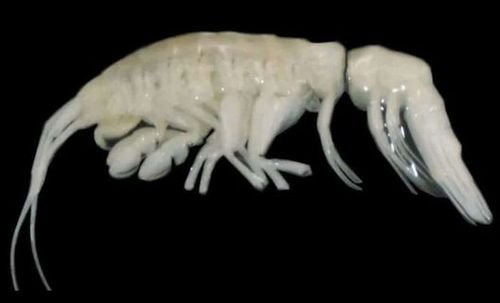A recent discovery in the deep sea has shed light on a new species of predator that has evolved to thrive in the harsh environment of the deep sea. The species, called Dulcibella camanchaca, has been found in the Atacama Trench, a deep-sea trench located in the South Pacific Ocean. This discovery has provided scientists with a unique opportunity to study the anatomy and behavior of this deep-sea predator.

https://nayagoogle.com/question/10014777/
Anatomy of Dulcibella camanchaca: Dulcibella camanchaca is a small, white, science-fiction-like looking crustacean about 4 cm in length. Its body is very mobile and equipped with special appendages for hunting in complete darkness. These appendages are long and sticky, allowing this creature to capture prey without arousing suspicion. The research team describes the anatomy of Dulcibella camanchaca as a "highly mobile body that makes them effective at capturing, killing, and feasting".
Hunting Behavior: Dulcibella camanchaca is a fast-swimming predator that uses its appendages to catch its prey. It is able to hunt in complete darkness, using its specialized appendages to locate and capture its prey. This creature's ability to hunt in the dark is likely due to the fact that it has evolved to thrive in the deep ocean, where there is very little sunlight. The research team has found that Dulcibella camanchaca is a natural predator despite its small size.
Species Discovery: Dulcibella camanchaca was discovered by a team of scientists from the Woods Hole Oceanographic Institution and the Instituto Milenio de Oceanografía. The discovery was made during an expedition to the Atacama Trench, where the team was researching deep-sea biodiversity. The species was named after the word for "darkness" in the languages of people from the Andes region, meaning the deep, dark sea from which it hunts.
Significance of Discovery: The discovery of Dulcibella camanchaca is significant as it highlights the ongoing biodiversity discoveries in the Atacama Trench. This species is a new species and has never been seen before, giving scientists a unique opportunity to study the evolution and behavior of deep-sea predators. The discovery also highlights the importance of the deep sea as a habitat for many species, many of which are still unknown to science.
Atacama Trench: The Atacama Trench is a deep-sea trench located in the South Pacific Ocean off the coast of South America. It is one of the deepest points in the ocean, with a maximum depth of about 8,000 meters. The trench is a unique environment, with extreme pressure and temperature conditions that support a wide range of deep-sea life. The discovery of Dulcibella camanchaca in the Atacama Trench highlights the importance of this ecosystem as a habitat for deep-sea predators.
Conclusion: The discovery of Dulcibella camanchaca is an important discovery that sheds light on the evolution and behavior of deep-sea predators. The highly mobile body and specialized appendages of this species make it an effective predator in the deep sea. This discovery highlights the importance of the deep sea as a habitat for many species, many of which are still unknown to science. More research is needed to fully understand the behavior and ecology of Dulcibella camanchaca, but this discovery provides a unique opportunity to study the biology of deep-sea predators.